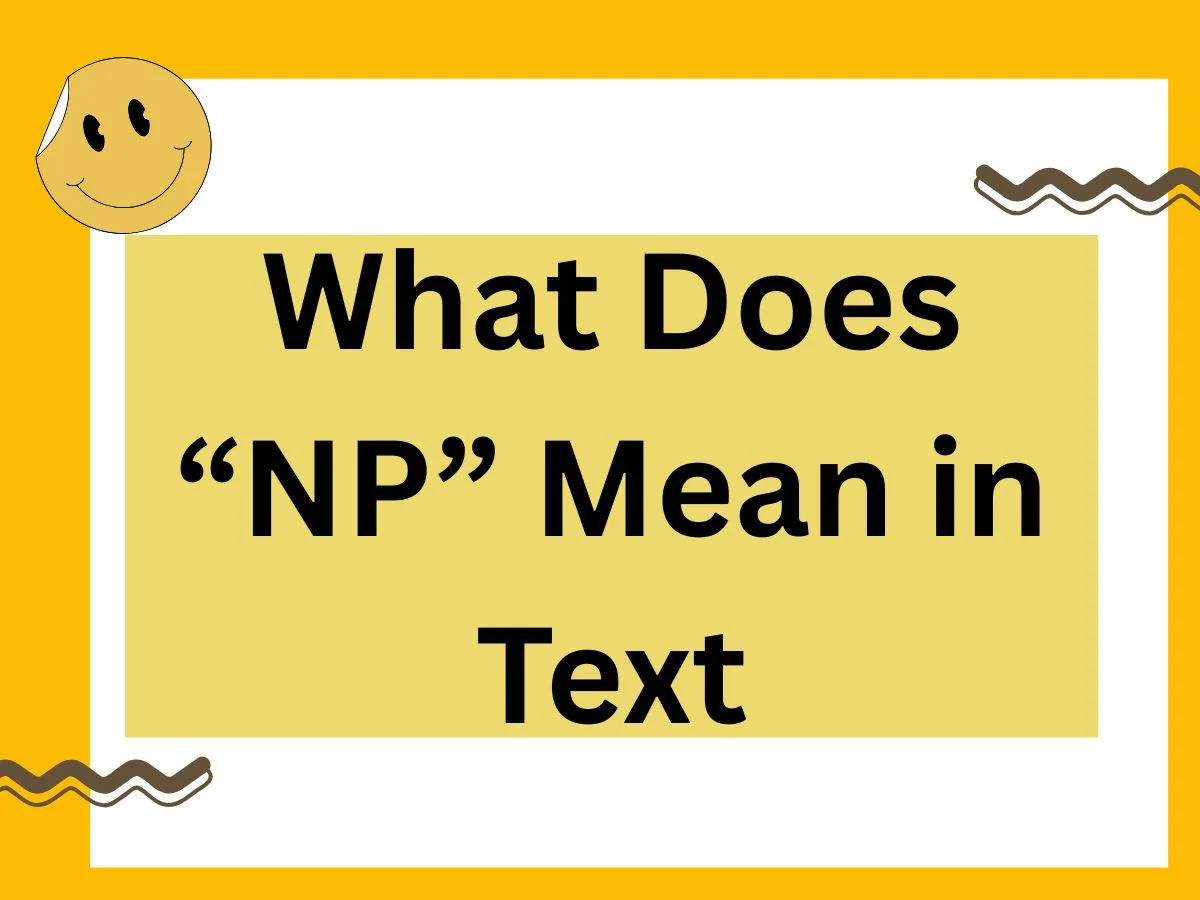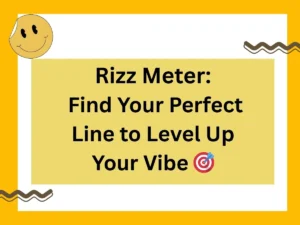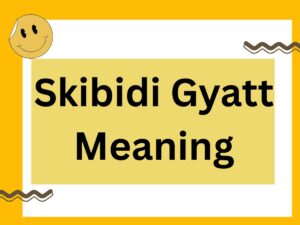In today’s fast-moving digital conversations, short forms dominate. Whether you’re replying to a quick “thanks” in a text or ending a chat thread in a gaming lobby, you might come across the abbreviation “NP.”
It’s short, it’s casual, and it’s everywhere. But like most abbreviations in online communication, its meaning depends on context, tone, and relationship between the people chatting.
🔥 Rizz Line Generator 🔥
In this article, we’ll go far beyond the basic definition of “NP” and explore how its meaning shifts across different scenarios, the subtleties of tone it carries, and the best alternative phrases to use in polite, professional, or casual exchanges. You’ll also find 10 premium-quality examples that illustrate exactly how to use these alternatives with precision.
The Core Meaning of “NP” in Text
At its simplest, “NP” means “No Problem.” It’s a short and friendly way to respond when someone thanks you or asks for a small favor.
Example:
A: “Thanks for sending me the file!”
B: “NP.”
In most situations, it’s a casual, positive response that signals “I’m happy to help” or “It wasn’t any trouble at all.” It’s widely used in:
- Text messages
- Online gaming chats
- Workplace instant messaging apps (Slack, Teams, Discord)
- Social media comments and DMs
But here’s where things get interesting: “NP” isn’t always interpreted the same way. The meaning stays the same, but the tone can shift depending on your delivery and the platform.
How Tone Shapes the Meaning of “NP”
While “NP” is straightforward in definition, its tone is highly flexible. This is where people sometimes misread it.
1. Friendly and Casual
When used between friends or in informal settings, “NP” is light, warm, and almost invisible—it’s the digital equivalent of smiling and waving off thanks.
Example:
“Hey, thanks for grabbing my coffee.”
“NP!”
2. Neutral Professional
In a work chat, “NP” can be polite but quick, signaling acknowledgment without overcommitting to emotional warmth.
Example:
“Thanks for updating the spreadsheet.”
“NP, happy to help.”
3. Dismissive or Rushed
Without an exclamation mark or friendly tone markers, “NP” can accidentally sound curt—especially if the recipient was expecting more enthusiasm.
Example:
“Thanks so much for staying late to finish that report!”
“np”
Here, the lowercase and lack of punctuation can feel like you’re brushing it off or trying to move on quickly.
Why Context Is Everything
In text-based communication, tone has to be implied—there’s no facial expression, body language, or vocal pitch to clarify your intent. That’s why “NP” works best when the relationship and setting are understood.
If you’re messaging a friend you’ve known for years, “NP” will be taken as casual and warm. If you’re emailing a client, it may come off as too casual—prompting you to choose a more formal alternative.
Professional vs. Casual Alternatives to “NP”
While “NP” is versatile, sometimes you’ll want a more tone-specific alternative to better match the situation.
Polite / Professional Alternatives
Use these when you’re in a business setting, speaking to clients, or corresponding with people you don’t know well.
- “You’re welcome.”
Classic, universally polite, works in all settings. - “My pleasure.”
Adds a personal touch of friendliness while staying professional. - “Happy to help.”
Signals warmth without over-familiarity. - “Glad I could assist.”
Professional and positive—good for customer support or client communication. - “Anytime.”
Open and encouraging, but still polite.
Casual / Friendly Alternatives
Use these in everyday texts, gaming chats, or with friends.
- “No worries!”
Light, laid-back, very common in casual speech. - “It’s all good.”
Relaxed, signals zero inconvenience. - “Sure thing!”
Energetic and friendly. - “Don’t mention it.”
A classic casual phrase, warm but modest. - “All good!”
Simple, cheerful, and reassuring.
How to Choose the Right Alternative
Choosing the right phrase depends on three main factors:
- Relationship with the Person
- Close friends → casual works fine
- Clients/bosses → polite and professional is safer
- Platform
- Email → avoid overly casual phrases unless rapport is strong
- Text/Social media → casual options are more natural
- Purpose of the Conversation
- Quick acknowledgment → “NP” or “No worries!”
- Building rapport → “Happy to help” or “My pleasure”
10 Premium Examples for Real Situations
These examples show how “NP” alternatives can be applied in context while adjusting for tone and platform.
Example 1 — Friendly Text Between Friends
“Thanks for lending me your charger last night.”
“No worries! Glad it came in handy.”
Example 2 — Professional Email to Client
“Thanks for providing those details so quickly.”
“My pleasure—happy we could get this sorted fast.”
Example 3 — Workplace Chat
“Thanks for fixing the bug in the code.”
“Glad I could assist. Let me know if anything else comes up.”
Example 4 — Gaming Chat
“Thx for the revive!”
“NP, we’ve got this!”
Example 5 — Neighborly Help
“Thanks for helping me carry those boxes.”
“It’s all good. Anytime!”
Example 6 — Formal Event Follow-Up
“We appreciate your help with the fundraiser.”
“You’re welcome. It was an honor to be part of it.”
Example 7 — Family Group Chat
“Thanks for watching the kids for me.”
“Sure thing! They were a joy.”
Example 8 — Study Group Exchange
“Thanks for sharing your notes.”
“Don’t mention it, I’m sure you’d do the same.”
Example 9 — Customer Service Reply
“Thanks for resolving my issue so quickly.”
“Happy to help. Is there anything else I can assist with?”
Example 10 — Quick Slack Message
“Thanks for staying late to finish the report.”
“Anytime—glad it’s wrapped up.”
Why This Matters in 2025 Digital Communication
In 2025, rapid-fire messaging across platforms like WhatsApp, Slack, Discord, and Microsoft Teams has made short acknowledgments like “NP” more common than ever. But with the rise of AI-assisted writing, automated responses, and cross-cultural communication, tone awareness has become more important.
A simple “NP” can feel warm and efficient to one person but cold and abrupt to another. The safest approach is tone-matching—mirror the warmth, formality, and style of the person you’re responding to.
In multilingual and multicultural chats, “NP” might not always translate well. In such cases, full phrases like “No problem” or “You’re welcome” carry less risk of misunderstanding.
The Bottom Line
“NP” is a versatile, modern abbreviation for “No problem.” It’s handy for quick, casual replies but isn’t always the best fit—especially in formal or sensitive situations. By learning tone-appropriate alternatives, you can communicate warmth, professionalism, or casual friendliness as needed.
When in doubt:
- With friends → “NP,” “No worries,” “All good”
- With colleagues → “Happy to help,” “Anytime”
- With clients or formal contacts → “You’re welcome,” “My pleasure”
The magic isn’t in the abbreviation—it’s in how you adapt it to fit the moment.





